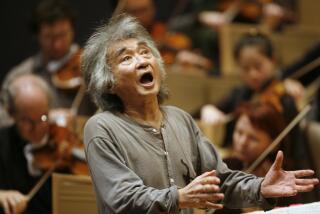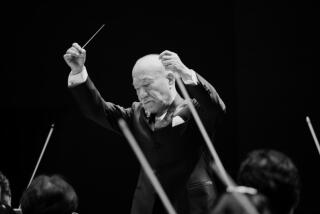Toru Takemitsu, Composer Who Blended East and West, Dies at 65
- Share via
TOKYO — Toru Takemitsu, a Japanese composer who won worldwide recognition for blending Eastern instruments and melodies with Western classical music, died Tuesday of complications of bladder cancer and pneumonia. He was 65.
Among Takemitsu’s best-known works is “November Steps,” which was commissioned by the New York Philharmonic and premiered in 1967.
The piece integrates two traditional Japanese instruments--the biwa, a short-necked lute, and the shakuhachi, a bamboo flute--with a standard symphony orchestra.
In 1985, pianist Peter Serkin gave the world premiere performance of Takemitsu’s “Riverrun” with the Los Angeles Philharmonic at the Dorothy Chandler Pavilion.
Last year, Takemitsu received a career achievement award at Los Angeles’ Nikko Hotel from the Society for the Preservation of Film Music. The prolific composer wrote more than 90 film scores in addition to a large catalog of symphonic, vocal, chamber and tape works.
Takemitsu completed his final work, a piece composed for French flutist Aurele Nicolet, in January, and had been working on his first opera at the time of his death.
“We must be thankful to Mr. Takemitsu for his achievement in introducing the music of the hearts of Japanese people to the world,” conductor Seiji Ozawa said in a statement from Vienna.
Takemitsu was born in Tokyo in 1930, spent his childhood in China and developed his first musical interest through American military radio in postwar Tokyo. He learned traditional Japanese music much later, and studied composition mostly on his own.
His “Requiem for Strings” in 1957 was praised by Stravinsky and became Takemitsu’s first work to be performed widely in Europe and North America.
The author of four books in Japanese, Takemitsu was a guest regents lecturer at UC San Diego in 1981.
He is survived by his wife, Asaka, and a daughter, Maki.
More to Read
The biggest entertainment stories
Get our big stories about Hollywood, film, television, music, arts, culture and more right in your inbox as soon as they publish.
You may occasionally receive promotional content from the Los Angeles Times.










